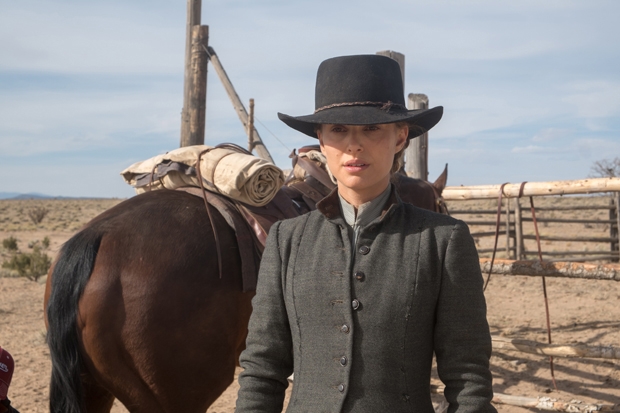Jane Got a Gun is being sold as a rousing feminist Western although the truth is that it’s about as rousing and feminist as my cat, Daphne, who is 17, and now barely moves but who, back in the day, made herself available to every passing Tom. So you don’t look at Daphne and think ‘rousing feminist’, just as you don’t come away from this film and think ‘rousing feminism’ — assuming you are minded to think anything at all, and haven’t just been bored to death.
Produced by Natalie Portman, who also stars, the film has had its troubles. The interesting art-house auteur Lynne Ramsay (We Need to Talk About Kevin, Ratcatcher) was meant to direct but on the first day of filming she failed to turn up, which was mightily inconsiderate, but perhaps she’d read the script by then. So Ramsay bolted, which caused Bradley Cooper to also bolt, who was, in any case, a replacement for Jude Law, who had previously bolted. A substitute director, Gavin O’Connor (Warrior, Pride and Glory), was drafted in, along with Ewan McGregor to replace the Bradley Cooper that had been Jude Law. However, such difficulties need not be definitive. Harvey Keitel was fired from Apocalypse Now six weeks into filming, and speedily substituted with Martin Sheen, for example. So troubled productions can become great films, but this troubled production is not one of them.
This is storytelling at its most pedestrian. It’s set in the New Mexico Territory, 1871, but with flashbacks taking us, for instance, to Missouri, 1864, which the caption informs us is ‘seven years earlier’ — helpful if basic mental arithmetic is not your thing, or you are four. Portman plays Jane, who is holed up on her homestead when her husband, Bill (Noah Emmerich, who was probably a replacement for someone or other who bolted), trucks up on his horse. ‘Daddy!’, cries their little girl. But then daddy falls off his horse and is discovered to be full of bullet holes and barely alive.
Daddy has had a run-in with John Bishop (McGregor, not the Liverpool comedian, although a few jokes would have been most welcome) and his gang of outlaws. Such is the characterisation here that we know Bishop is truly dastardly because he wears a villainous black hat and possesses a villainous black moustache that twitches above teeth so blindingly white they’d have to be a dental miracle for New Mexico, 1871, as well as Missouri, 1864, which is seven years earlier. Bishop and Jane have some kind of history, as yet unexplained, so she knows he’ll be coming for her next.
Jane got a gun all right, but what does Jane do with the gun she got? She tucks it into her skirt and gallops across the scrubby plains to enlist the help of Dan (Joel Edgerton, who co-wrote, and therefore could not reasonably bolt), whose heart she once broke and who, handily, appears to have settled nearby in an otherwise empty landscape. ‘No’, says Dan, in effect. ‘I won’t help you. Why should I when you broke my heart?’ And so on and so on until he says ‘yes’, as we always knew he would, this being storytelling at its most pedestrian. In fact, nothing happens in this film that you won’t see coming a mile off, two miles off, five miles off, from outer space.
So Dan and Jane prepare for their showdown with Bishop, as frequently interrupted by the clumsy flashbacks, which are essentially expositional beasts, acquainting us with Jane’s connection to Bishop, and Jane and Dan’s one-time romance, which has them skipping through golden cornfields as if in a Timotei ad. Why any of this is interesting, or even matters, I don’t know. And, prior to the finale, which mercilessly wrings out all the pathos there is in the world, there’s the inevitable shoot-out during which Jane also gets a gun, but proves useless with the gun she got, so has to rely on male help again. This is no more a rousing feminist film than Daphne is a rousing feminist cat, the difference being, I suppose, that Daphne doesn’t expect me to sit and watch her for 98 minutes, which would also bore me half to death.






Comments